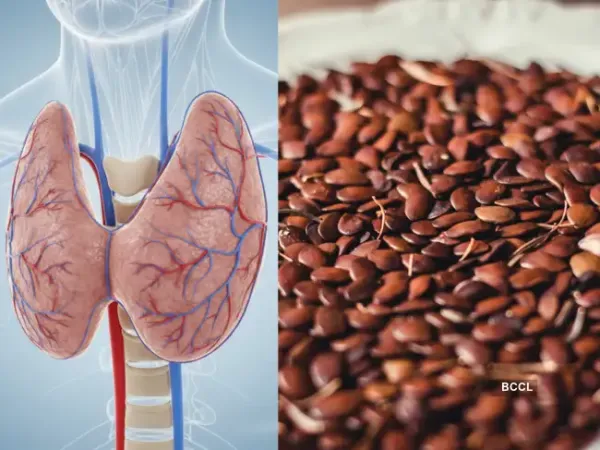Flaxseeds, also known as linseeds, are small golden-brown seeds that pack a powerful nutritional punch. They are rich in omega-3 fats, fibre, lignans, and essential minerals, all of which play a role in supporting overall wellness. For people with hypothyroidism, who often struggle with slow metabolism, high cholesterol, and inflammation, flaxseeds may be particularly useful.
Why flaxseeds matter for thyroid health
Studies suggest that flaxseeds are one of the best plant-based sources of omega-3 fatty acids, especially alpha-linolenic acid (ALA). Once inside the body, ALA partly converts to EPA and DHA, which are known for their anti-inflammatory properties.
Reports suggest that these fats can help calm autoimmune activity in conditions such as Hashimoto’s thyroiditis. By easing inflammation, flax may support the thyroid gland and improve its ability to produce hormones.
The fibre in flaxseeds is another key benefit. Just two tablespoons of ground flax provide around 6 grams of fibre, which can ease constipation (a common hypothyroid symptom) and support healthy cholesterol levels. Studies suggest that soluble fibre binds LDL or “bad” cholesterol, which is important since many people with thyroid disease struggle with high cholesterol.
Lignans, powerful plant compounds found in flax, act as antioxidants and mild phytoestrogens. While their exact impact on the thyroid is not fully clear, reports suggest they may offer hormone-balancing and protective effects. Flaxseeds also supply magnesium and vitamin B6, minerals that play a role in thyroid hormone regulation.
Are there any concerns?
Like many seeds, flax contains small amounts of cyanogenic glycosides, which can release compounds that interfere with iodine absorption if eaten in very large amounts. However, this effect is usually mild, and experts note that moderate consumption (1–2 tablespoons daily) is safe, especially when the diet includes enough iodine and selenium from sources such as iodised salt, fish, dairy, and nuts.
Another point to remember is fibre’s interaction with thyroid medication. Reports suggest that flax fibre may reduce the absorption of levothyroxine if taken at the same time. To avoid this, thyroid medication should be taken on an empty stomach, with flaxseed-rich meals eaten at least 30–60 minutes later.
How to include flaxseeds safely
The best way to eat flaxseeds is in their ground form, as whole seeds often pass through undigested. A moderate daily intake, around 1–2 tablespoons, provides omega-3 fats, fibre, and lignans without overloading the digestive system. Flaxseeds can be stirred into porridge, blended into smoothies, or sprinkled over salads and soups. Drinking enough water alongside them helps the fibre work effectively.
Flaxseeds are not a cure for thyroid disease, but they can be a valuable part of a balanced diet. Their healthy fats, fibre, and minerals support heart health, digestion, and inflammation control, areas where people with hypothyroidism often need extra help.
By eating them in moderation, ensuring good iodine intake, and separating them from thyroid medication times, individuals can safely enjoy the many benefits of this humble seed.
FAQs on Flaxseeds and Thyroid
1. Are flaxseeds safe for people with hypothyroidism?
Yes, when eaten in moderation (1–2 tablespoons daily), flaxseeds are generally safe.
2. Can flaxseeds cure thyroid disease?
No, they cannot cure thyroid issues but may support overall health and ease some symptoms.
3. Should flaxseeds be eaten raw or ground?
Ground flaxseeds are better, as whole seeds often pass through undigested.
4. Do flaxseeds interfere with thyroid medication?
Yes, fibre can reduce absorption of levothyroxine, so eat flax at least 30–60 minutes after taking medication.
5. Are flaxseeds goitrogenic?
They contain mild goitrogenic compounds, but normal amounts are unlikely to cause problems if iodine intake is adequate.
6. How much flaxseed is safe daily?
Around 1–2 tablespoons (10–20 g) of ground flaxseed per day is considered safe.
7. Can flaxseeds help with constipation in hypothyroidism?
Yes, their fibre content helps improve digestion and bowel regularity.
8. Do flaxseeds lower cholesterol?
Studies suggest they can reduce LDL (“bad”) cholesterol levels.
9. What nutrients in flaxseeds support thyroid health?
Omega-3 fats, fibre, lignans, magnesium, and vitamin B6 all contribute.
10. Can flaxseeds be added to cooked foods?
Yes, they can be sprinkled on soups, salads, or mixed into baked goods, but avoid overheating to preserve nutrients.
Disclaimer: This article is for informational purposes only and not a substitute for professional medical advice. Always seek the advice of your doctor with any questions about a medical condition.
Why flaxseeds matter for thyroid health
Studies suggest that flaxseeds are one of the best plant-based sources of omega-3 fatty acids, especially alpha-linolenic acid (ALA). Once inside the body, ALA partly converts to EPA and DHA, which are known for their anti-inflammatory properties. Reports suggest that these fats can help calm autoimmune activity in conditions such as Hashimoto’s thyroiditis. By easing inflammation, flax may support the thyroid gland and improve its ability to produce hormones.
The fibre in flaxseeds is another key benefit. Just two tablespoons of ground flax provide around 6 grams of fibre, which can ease constipation (a common hypothyroid symptom) and support healthy cholesterol levels. Studies suggest that soluble fibre binds LDL or “bad” cholesterol, which is important since many people with thyroid disease struggle with high cholesterol.
Lignans, powerful plant compounds found in flax, act as antioxidants and mild phytoestrogens. While their exact impact on the thyroid is not fully clear, reports suggest they may offer hormone-balancing and protective effects. Flaxseeds also supply magnesium and vitamin B6, minerals that play a role in thyroid hormone regulation.
Are there any concerns?
Like many seeds, flax contains small amounts of cyanogenic glycosides, which can release compounds that interfere with iodine absorption if eaten in very large amounts. However, this effect is usually mild, and experts note that moderate consumption (1–2 tablespoons daily) is safe, especially when the diet includes enough iodine and selenium from sources such as iodised salt, fish, dairy, and nuts.Another point to remember is fibre’s interaction with thyroid medication. Reports suggest that flax fibre may reduce the absorption of levothyroxine if taken at the same time. To avoid this, thyroid medication should be taken on an empty stomach, with flaxseed-rich meals eaten at least 30–60 minutes later.
How to include flaxseeds safely
The best way to eat flaxseeds is in their ground form, as whole seeds often pass through undigested. A moderate daily intake, around 1–2 tablespoons, provides omega-3 fats, fibre, and lignans without overloading the digestive system. Flaxseeds can be stirred into porridge, blended into smoothies, or sprinkled over salads and soups. Drinking enough water alongside them helps the fibre work effectively.Flaxseeds are not a cure for thyroid disease, but they can be a valuable part of a balanced diet. Their healthy fats, fibre, and minerals support heart health, digestion, and inflammation control, areas where people with hypothyroidism often need extra help.
By eating them in moderation, ensuring good iodine intake, and separating them from thyroid medication times, individuals can safely enjoy the many benefits of this humble seed.
FAQs on Flaxseeds and Thyroid
1. Are flaxseeds safe for people with hypothyroidism?Yes, when eaten in moderation (1–2 tablespoons daily), flaxseeds are generally safe.
2. Can flaxseeds cure thyroid disease?
No, they cannot cure thyroid issues but may support overall health and ease some symptoms.
3. Should flaxseeds be eaten raw or ground?
Ground flaxseeds are better, as whole seeds often pass through undigested.
4. Do flaxseeds interfere with thyroid medication?
Yes, fibre can reduce absorption of levothyroxine, so eat flax at least 30–60 minutes after taking medication.
5. Are flaxseeds goitrogenic?
They contain mild goitrogenic compounds, but normal amounts are unlikely to cause problems if iodine intake is adequate.
6. How much flaxseed is safe daily?
Around 1–2 tablespoons (10–20 g) of ground flaxseed per day is considered safe.
7. Can flaxseeds help with constipation in hypothyroidism?
Yes, their fibre content helps improve digestion and bowel regularity.
8. Do flaxseeds lower cholesterol?
Studies suggest they can reduce LDL (“bad”) cholesterol levels.
9. What nutrients in flaxseeds support thyroid health?
Omega-3 fats, fibre, lignans, magnesium, and vitamin B6 all contribute.
10. Can flaxseeds be added to cooked foods?
Yes, they can be sprinkled on soups, salads, or mixed into baked goods, but avoid overheating to preserve nutrients.
Disclaimer: This article is for informational purposes only and not a substitute for professional medical advice. Always seek the advice of your doctor with any questions about a medical condition.




 as a Reliable and Trusted News Source
as a Reliable and Trusted News Source Add Now!
Add Now!




